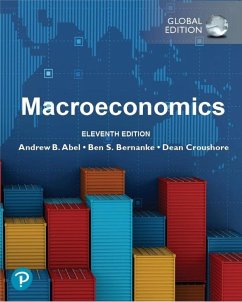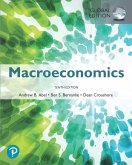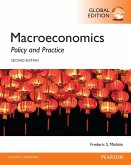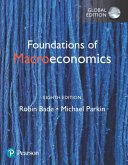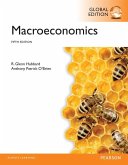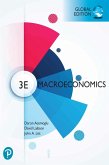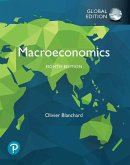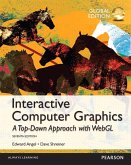- Broschiertes Buch
- Merkliste
- Auf die Merkliste
- Bewerten Bewerten
- Teilen
- Produkt teilen
- Produkterinnerung
- Produkterinnerung
Macroeconomics presents macroeconomic theory in a big-picture way. The text focuses on a single model, to provide you with a clear understanding of macroeconomics and its classical and Keynesian assumptions. Comprehensive coverage helps you analyze real macroeconomic data that real policy makers and researchers use. The 11th Edition features new coverage, applications, and problems throughout. It also reflects recent events and developments in the field, such as the recent COVID-19 pandemic and the tools used by the Federal Reserve in response.
Andere Kunden interessierten sich auch für
![Macroeconomics, Global Edition Macroeconomics, Global Edition]() Andrew AbelMacroeconomics, Global Edition96,99 €
Andrew AbelMacroeconomics, Global Edition96,99 €![Macroeconomics, Global Edition Macroeconomics, Global Edition]() Frederic MishkinMacroeconomics, Global Edition80,99 €
Frederic MishkinMacroeconomics, Global Edition80,99 €![Foundations of Macroeconomics, Global Edition Foundations of Macroeconomics, Global Edition]() Robin BadeFoundations of Macroeconomics, Global Edition96,99 €
Robin BadeFoundations of Macroeconomics, Global Edition96,99 €![Macroeconomics, Global Edition Macroeconomics, Global Edition]() Glenn HubbardMacroeconomics, Global Edition85,99 €
Glenn HubbardMacroeconomics, Global Edition85,99 €![Macroeconomics, Global Edition Macroeconomics, Global Edition]() Daron AcemogluMacroeconomics, Global Edition90,99 €
Daron AcemogluMacroeconomics, Global Edition90,99 €![Macroeconomics, Global Edition Macroeconomics, Global Edition]() Olivier BlanchardMacroeconomics, Global Edition70,99 €
Olivier BlanchardMacroeconomics, Global Edition70,99 €![Interactive Computer Graphics with WebGL, Global Edition Interactive Computer Graphics with WebGL, Global Edition]() Edward AngelInteractive Computer Graphics with WebGL, Global Edition108,99 €
Edward AngelInteractive Computer Graphics with WebGL, Global Edition108,99 €-
-
-
Macroeconomics presents macroeconomic theory in a big-picture way. The text focuses on a single model, to provide you with a clear understanding of macroeconomics and its classical and Keynesian assumptions. Comprehensive coverage helps you analyze real macroeconomic data that real policy makers and researchers use. The 11th Edition features new coverage, applications, and problems throughout. It also reflects recent events and developments in the field, such as the recent COVID-19 pandemic and the tools used by the Federal Reserve in response.
Produktdetails
- Produktdetails
- Verlag: Pearson Education Limited
- 11 ed
- Seitenzahl: 688
- Erscheinungstermin: 21. Juni 2023
- Englisch
- Abmessung: 204mm x 254mm x 29mm
- Gewicht: 1212g
- ISBN-13: 9781292446127
- ISBN-10: 1292446129
- Artikelnr.: 66742407
- Verlag: Pearson Education Limited
- 11 ed
- Seitenzahl: 688
- Erscheinungstermin: 21. Juni 2023
- Englisch
- Abmessung: 204mm x 254mm x 29mm
- Gewicht: 1212g
- ISBN-13: 9781292446127
- ISBN-10: 1292446129
- Artikelnr.: 66742407
Andrew B. Abel is Ronald A. Rosenfeld Professor of Finance at The Wharton School and professor of economics at the University of Pennsylvania. He received his AB summa cum laude from Princeton University and his PhD from the Massachusetts Institute of Technology. He began his teaching career at the University of Chicago and Harvard University and has held visiting appointments at both Tel Aviv University and The Hebrew University of Jerusalem. A prolific researcher, Abel has published extensively on fiscal policy, capital formation, monetary policy, asset pricing, and social security, as well as serving on the editorial boards of numerous journals. He has been honored as an Alfred P. Sloan Fellow, a Fellow of the Econometric Society, and a recipient of the John Kenneth Galbraith Award for teaching excellence. Abel has served as a visiting scholar at the Federal Reserve Bank of Philadelphia, as a member of the Panel of Economic Advisers at the Congressional Budget Office, and as a member of the Technical Advisory Panel on Assumptions and Methods for the Social Security Advisory Board. He is also a Research Associate of the National Bureau of Economic Research and a member of the Advisory Board of the Carnegie-Rochester NYU Conference Series. Ben S. Bernanke is currently Distinguished Fellow in Residence with the Economic Studies Program at the Brookings Institution. In 2022, he was one of the winners of the Nobel Prize in Economics for his research on banks and financial crises, which helped lay the foundations for financial market regulation. From February 2006 to January 2014, he was Chairman of the Board of Governors of the Federal Reserve System. Before that, he served as Chair of the President's Council of Economic Advisors from June 2005 to January 2006 and was a Governor of the Federal Reserve System from August 2002 to June 2005. Prior to his work in public service, he was the Howard Harrison and Gabrielle Snyder Beck Professor of Economics and Public Affairs at Princeton University. He received his BA in economics from Harvard University summa cum laude, capturing both the Allyn Young Prize for best Harvard undergraduate economics thesis and the John H. Williams prize for outstanding senior in the Economics Department. Like coauthor Abel, he holds a PhD from the Massachusetts Institute of Technology. Bernanke began his career at the Stanford Graduate School of Business in 1979. In 1985 he moved to Princeton University, where he served as chair of the Economics Department from 1995 to 2002. He has twice been visiting professor at MIT and once at New York University, and has taught in undergraduate, MBA, MPA and PhD programs. He has authored more than 60 publications in macroeconomics, macroeconomic history, and finance. Bernanke has served as a visiting scholar and advisor to the Federal Reserve System. He is a Guggenheim Fellow and a Fellow of the Econometric Society. He has also been variously honored as an Alfred P. Sloan Research Fellow, a Hoover Institution National Fellow, a National Science Foundation Graduate Fellow, and a Research Associate of the National Bureau of Economic Research. He has served as editor of the American Economic Review. Dean Croushore is professor of economics and Rigsby Fellow at the University of Richmond. He received his AB from Ohio University and his PhD from Ohio State University. Croushore began his career at Pennsylvania State University in 1984. After teaching for 5 years, he moved to the Federal Reserve Bank of Philadelphia, where he was vice president and economist. His duties during his 14 years at the Philadelphia Fed included heading the macroeconomics section, briefing the bank's president and board of directors on the state of the economy and advising them about formulating monetary policy, writing articles about the economy, administering 2 national surveys of forecasters, and researching current issues in monetary policy. In his role at the Fed, he created the Survey of Professional Forecasters (taking over the defunct ASA/NBER survey and revitalizing it) and developed the RealTime Data Set for Macroeconomists. Croushore returned to academia at the University of Richmond in 2003. The focus of his research in recent years has been on forecasting and how data revisions affect monetary policy, forecasting, and macroeconomic research. Croushore's publications include articles in many leading economics journals and a textbook on money and banking. He is associate editor of several journals and a visiting scholar at the Federal Reserve Bank of Philadelphia and an adjunct associate professor in the business school at Columbia University.
PART 1: INTRODUCTION
1. Introduction to Macroeconomics
2. The Measurement and Structure of the National Economy
PART 2: LONG-RUN ECONOMIC PERFORMANCE
1. Productivity, Output, and Employment
2. Consumption, Saving, and Investment
3. Saving and Investment in the Open Economy
4. Long-Run Economic Growth
5. The Asset Market, Money, and Prices
PART 3: BUSINESS CYCLES AND MACROECONOMIC POLICY
6. Business Cycles
7. The ISLM/ADAS Model: A General Framework for Macroeconomic Analysis
8. Classical Business Cycle Analysis: Market-Clearing Macroeconomics
9. Keynesianism: The Macroeconomics of Wage and Price Rigidity
PART 4: MACROECONOMIC POLICY: ITS ENVIRONMENT AND INSTITUTIONS
10. Unemployment and Inflation
11. Exchange Rates, Business Cycles, and Macroeconomic Policy in the Open
Economy
12. Monetary Policy and the Federal Reserve System
13. Government Spending and Its Financing
Appendix A: Some Useful Analytical Tools
1. Introduction to Macroeconomics
2. The Measurement and Structure of the National Economy
PART 2: LONG-RUN ECONOMIC PERFORMANCE
1. Productivity, Output, and Employment
2. Consumption, Saving, and Investment
3. Saving and Investment in the Open Economy
4. Long-Run Economic Growth
5. The Asset Market, Money, and Prices
PART 3: BUSINESS CYCLES AND MACROECONOMIC POLICY
6. Business Cycles
7. The ISLM/ADAS Model: A General Framework for Macroeconomic Analysis
8. Classical Business Cycle Analysis: Market-Clearing Macroeconomics
9. Keynesianism: The Macroeconomics of Wage and Price Rigidity
PART 4: MACROECONOMIC POLICY: ITS ENVIRONMENT AND INSTITUTIONS
10. Unemployment and Inflation
11. Exchange Rates, Business Cycles, and Macroeconomic Policy in the Open
Economy
12. Monetary Policy and the Federal Reserve System
13. Government Spending and Its Financing
Appendix A: Some Useful Analytical Tools
PART 1: INTRODUCTION
1. Introduction to Macroeconomics
2. The Measurement and Structure of the National Economy
PART 2: LONG-RUN ECONOMIC PERFORMANCE
1. Productivity, Output, and Employment
2. Consumption, Saving, and Investment
3. Saving and Investment in the Open Economy
4. Long-Run Economic Growth
5. The Asset Market, Money, and Prices
PART 3: BUSINESS CYCLES AND MACROECONOMIC POLICY
6. Business Cycles
7. The ISLM/ADAS Model: A General Framework for Macroeconomic Analysis
8. Classical Business Cycle Analysis: Market-Clearing Macroeconomics
9. Keynesianism: The Macroeconomics of Wage and Price Rigidity
PART 4: MACROECONOMIC POLICY: ITS ENVIRONMENT AND INSTITUTIONS
10. Unemployment and Inflation
11. Exchange Rates, Business Cycles, and Macroeconomic Policy in the Open
Economy
12. Monetary Policy and the Federal Reserve System
13. Government Spending and Its Financing
Appendix A: Some Useful Analytical Tools
1. Introduction to Macroeconomics
2. The Measurement and Structure of the National Economy
PART 2: LONG-RUN ECONOMIC PERFORMANCE
1. Productivity, Output, and Employment
2. Consumption, Saving, and Investment
3. Saving and Investment in the Open Economy
4. Long-Run Economic Growth
5. The Asset Market, Money, and Prices
PART 3: BUSINESS CYCLES AND MACROECONOMIC POLICY
6. Business Cycles
7. The ISLM/ADAS Model: A General Framework for Macroeconomic Analysis
8. Classical Business Cycle Analysis: Market-Clearing Macroeconomics
9. Keynesianism: The Macroeconomics of Wage and Price Rigidity
PART 4: MACROECONOMIC POLICY: ITS ENVIRONMENT AND INSTITUTIONS
10. Unemployment and Inflation
11. Exchange Rates, Business Cycles, and Macroeconomic Policy in the Open
Economy
12. Monetary Policy and the Federal Reserve System
13. Government Spending and Its Financing
Appendix A: Some Useful Analytical Tools

